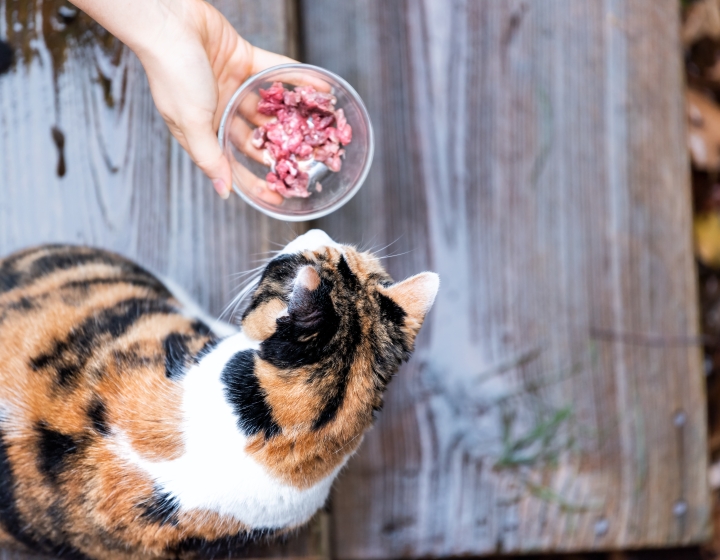Veterinary students return for more creative opportunities at the Animal Health Hackathon

In the Brooklyn-style lofts that overlook Collegetown, students from across Cornell University competed this January to see whose idea could be the next big breakthrough in animal health at the second annual Animal Health Hackathon. Teams tackled everything from doggy goggles to cow finders.
Many of the students who participated in the 2017 hackathon returned to eHub in Collegetown for this year’s event, including third-year veterinary student Rachel Hilliard. Hilliard attributes the amount of returnees to the hackathon’s creative and energetic atmosphere. “It’s a great practice in cooperative teamwork,” she said.
In his welcome address, Lorin D. Warnick Ph.D. ’94, the Austin O. Hooey Dean of Veterinary Medicine, encouraged groups to find team members from multiple disciplines in order to give their ideas scope. Students came from every college on Cornell’s Ithaca campus, and competed alongside students from Binghamton University, Georgia Tech, New York University, and Tufts University.
Of the 128 students who participated, over 50 pitched their original ideas on Friday night, hoping to attract team members. From those pitches, 24 teams emerged to compete, each comprised of students from multiple colleges.
“The hackathon was refreshing – and essential in providing veterinary students with the reminder that there is so much more out there than our particular area, that much can be gained by collaborating with other professionals,” said Nicholas Walsh ’16, a third-year veterinary student who also returned to compete.

Several returnees used the year since the first hackathon to hone skills that would give them a competitive edge in 2018. Fourth-year veterinary student Morgan Feldman ’14 noted that since the 2017 event, she’s learned more about the clinical environment and had real interactions with clients, which gave her better insight into what areas of animal health could use innovation in the 2018 hackathon. Emma Castillo, a third-year veterinary student, focused on the flipside of that, using the past year to grow her public speaking skills and practice selling ideas.
In addition to cross-college collaborations, students got to see their business ideas come to rapid fruition in the course of a single weekend. The College of Veterinary Medicine partnered with Entrepreneurship at Cornell to facilitate these innovative skills.
“I learned that it’s always valuable to step outside your comfort zone,” said veterinary student Amari Suskin-Sperry about her first hackathon experience. “From an initial concept to a fully-functioning app, my idea grew into a product in 36 hours.”
By the end of the weekend, non-veterinary students learned about issues facing veterinary medicine and saw how those issues affect their own field, said Isabel Jimenez ’15, a third-year veterinary student. Jimenez cited Hive Mind, a team from last year’s event that developed an app to assist beekeepers in monitoring the health of their colonies. “Many students who participated probably gained some knowledge over the weekend about why protecting bees goes beyond veterinary medicine or entomology,” she said.

This year, a group member from Hive Mind joined Jimenez’s team. They used the same neural network principles developed last year to build an app to successfully differentiate similar internal parasites under a microscope. “It’s a cool example of bringing things forward and learning from last year as we work to solve different problems,” said Jimenez.
While last year’s grand prize winners developed an app that leveraged GPS technology and social media to locate lost pets, this year’s winning invention was decidedly more low-tech and light-hearted. The idea? Hygena Pet—a waterproof, nontoxic spray for Fido’s rear end that prevents the pesky problem of poop sticking to fur. The group included Bruce Ahn ’18, Elvis Ahn ’20, Prathamesh Bang ’20, Lucian Chown ’19, Adam Itzkowitz ’20, Woo Jeon ’18, and Ohad Koronyo ’20.
Four more groups won additional honors in the event’s verticals. Encompass won the diagnostics and therapeutics vertical with an app that gathers clients’ preferences and habits to help veterinarians customize their care. CATcher and Squeak tied in the customer experience vertical, each creating a smart trap for feral cats and mice respectively. CowFinder won the workflow vertical with a product that helps locate a specific dairy cow in a herd, and honorable mentions went to the ideas DoggoVision and Therashoe.
“The hackathon brings together so many diverse fields that can learn from each other, gain exposure to issues that have a broader context, and build solutions together,” said Jimenez. “Everyone benefits from that.”

By Melanie Greaver Cordova



